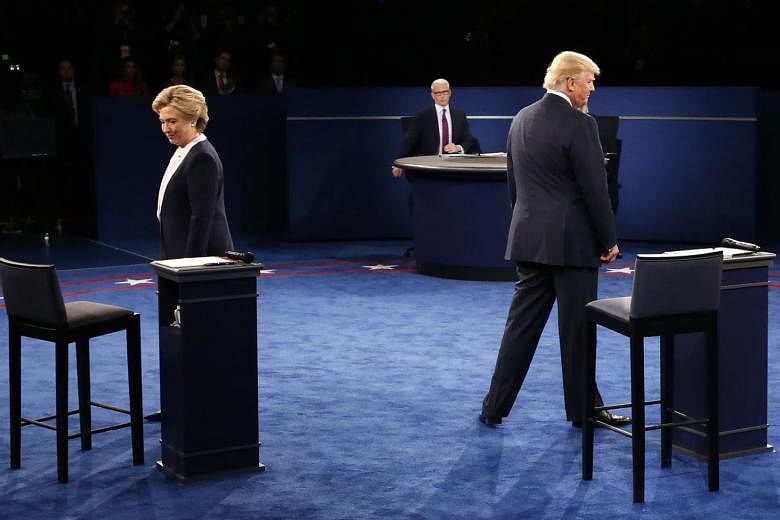WASHINGTON • When Singaporean student Kenneth Sng was given the privilege of delivering brief remarks before the start of the second presidential debate in St Louis on Sunday, he decided to use that time to embark on a defence of democracy.
In a speech that lasted all of one minute but that took him two weeks to write, the 24-year-old lamented the loss of confidence in democratic principles around the world and hoped that the US campaign would renew faith in the process.
"This debate provides a momentous occasion to show that while citizens may disagree fervently on issues, they agree that it is important to stay engaged in the democratic process," he said.
Yet, nearly everything that came before and after his 60-second speech raised the question of whether Mr Sng backed the wrong horse - or if he was indirectly targeting his remarks at Americans.
None of the events of the past week, or indeed the past year, can be considered in anybody's book a strong advertisement for the enduring qualities of a democracy.
Having one candidate openly pledge to imprison another, inviting a foreign power to intervene in the election and proposing a religious test for entry are normally not the hallmarks of the sort of democracy the US espouses. Neither, of course, is having a party clandestinely sabotage one of its candidates in favour of another or have a nominee rise to the top, despite being mired in a litany of scandals.

More than once, I've heard it remarked that it is unbelievable that the world's oldest democracy produced perhaps the two most flawed candidates. A majority of American adults - some 56 per cent for Mrs Hillary Clinton and 63 per cent for Mr Donald Trump - view them unfavourably.
The big question is thus whether this is a long-term issue or one confined to the unique pressures of a presidential campaign. Will everything snap back to normal once the election is over?
Will the world look back at this next year and laugh about this isolated crazy phase the US went through? Or would something more fundamental have changed about the US and its standing in the world?
DAMAGE DONE
Domestically, there is little optimism that whoever wins the White House will herald a new era of effective government.
Barring an almost impossible landslide that unites the White House and both chambers of Congress under the same party, the gridlock that marred the past eight years will likely mar the next four.
For all his proclamations of changes he will bring to Washington, few people understand exactly how Mr Trump can achieve anything he wants to do without a cooperative Congress.
And though he has often touted his negotiation skills, his recent attacks on lawmakers in his own party, including the Speaker of the House, merely damage relationships he will need as president.
Similarly, despite Mrs Clinton's long history in politics, she remains an unpopular figure in the Republican Party and has on her agenda many progressive items that conservative lawmakers would instinctively object to.
Experts agree that if a Clinton presidency begins with the White House being at loggerheads with Congress on issues like climate change, immigration and minimum wage, then the relationship between the two parties will remain as acrimonious as it was before.
Perhaps a more cooperative mood might prevail if the president starts with a legislative agenda that has more common ground - things like infrastructure investment and economic measures.
But that is likely to run up against the deep polarisation that the election campaign has thrown up. The success of Senator Bernie Sanders' campaign means that the more progressive wings of the Democratic Party remain deeply suspicious of Mrs Clinton. She may not be able to afford starting out by prioritising moderate issues.
At stake is more than just governance. Continued gridlock could have a dire impact on the US' global standing as well.
As it is, even the conduct of the current election has led China to openly question the US' credibility as a world leader. A recent editorial in the state-owned People's Daily said: "For a long time, the United States has boasted about how its extremely lively election is a sign of the superiority of its system, and has even used this to wilfully criticise the vast majority of developing countries. This extreme self-belief and arrogance by the 'preacher of democracy' should be reined in."
Expect more such questioning if the US emerges from an embarrassing election to no improvement.
As New York Times columnist Thomas Friedman recently wrote: "If we will have indulged in almost two years of electoral entertainment and pathos just to end up back where we were, only worse, with even more venomous gridlock in Washington, it won't just be emotionally depressing, we'll really start to decline as a nation."
WINDING BACK NATIONALISM?
Along the same lines is the matter of whether the nationalism uncorked by the current election campaign can be put back in the bottle after the election is over.
Mr Trump has given voice to the forces of nationalism with his "America First" campaign and it is now clear that the message resonates with a very significant portion of the American population.
In the span of a year, polls show that the support for American intervention overseas and free trade has dropped among US citizens. Many who used to regard trade as positive now blame it for many of their economic ills. Meanwhile, many Republicans who used to support US military intervention overseas have now been swayed by arguments from their party nominee that the US commitment to the North Atlantic Treaty Organisation should be reviewed, and that it needs to do less or get paid more for its support of treaty allies in Asia.
Whether Mr Trump becomes president or not, those issues have now been injected into the US national political discourse. Whoever is president will have a harder time convincing the nation of the utility of the US playing a global role.
Then there is the tone of political discourse. The confrontational, insulting, no-holds-barred tone of the US campaign seems to be spreading.
The ugly campaign has mainstreamed an ugly version of civic disagreements - one where everyone is entitled to his or her own set of facts, and where nothing is out of bounds in an attempt to win an argument.
While the extent to which any of these things becomes a lasting issue will vary depending on who wins and by what margin, at least some damage has already been done.
Maybe in time, decades from now, historians will look back at 2016 as an anomaly.
But for now, it is a reminder that a political campaign can make a difference beyond just who wins an election, to affect a nation's political tone and its standing in the world.


